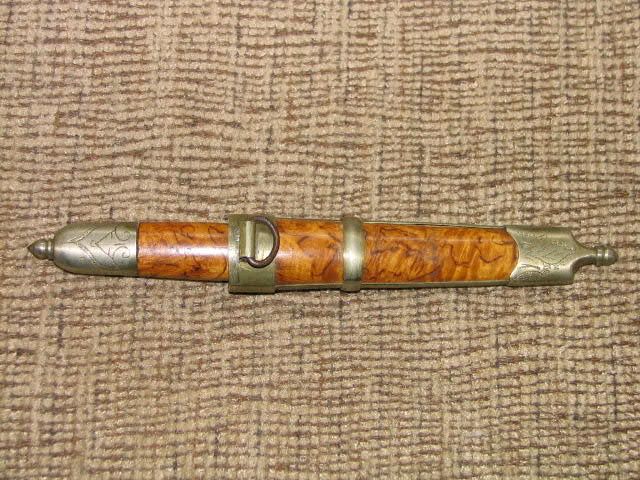
 |
|
|
#1 |
|
Member
Join Date: Jul 2009
Posts: 214
|
I've been meaning to post this and several other items i've picked up since getting together with Lee this past summer. This was my first foray into non Indo-Persian ethnographic weapons which I have Lee to thank for peaking my interest in. I picked this up in an antique store labeled as an " Southeast Asian Knife ". Something about the heart motif in the sheath and the shape of the handle as well as the tang nut was telling me this wasn't right. Hearts as a decorative motif we used in northern and central Europe on everything from weapons and armour to ceramics and furniture. I'm used to seeing tang nuts on European weapons but not so much those of the orient but untimately it was the shape of the hilt and the blade that had me comming up with puukko knife.
The sheath seems to be " German silver " while the hilt furniture including the pommel nut and three insets by the flower decoration on the handle are all real silver. There are 96 tiny brass tacks inset around the handle as well. The flower motif in the handle from what I can gather while looking like bone may be the horn of the indigenous reindeer. I am unsure if the hilt is a hardwood or horn as it is very smooth. On the back of the sheath are the letters KH on the mount for the loop that would hold the chain and snap for suspension that seems to have been used to carry these. The inside of the sheath is lined with a thin leather. I've had a Swedish friend tell me that he actually believes this to be a Swedish soumi knife rather than a Finnish puukko. My best guess based on constructional techniques is later 19th century or early 20th century. Any thoughts on how far off I am, potential owner of the KH intitals ect. are more than welcome as my background is in European medieval and renaissance arms and armour so i'm very new to ethnographics. If this is in fact a puukko, from my research this seems to be one of the nicest examples I can find picture of. All thoughts welcome. |
|
|

|
|
|
#2 |
|
Member
Join Date: Dec 2004
Location: Inland Empire, Southern California USA
Posts: 160
|
Possibly a "dress" knife ( Bunadskniven) from Norway. Worn as part of traditional dress, (bunad).
Here is my example.   
Last edited by Nagawarrior; 25th March 2011 at 09:02 AM. |
|
|

|
|
|
#3 |
|
Member
Join Date: Jul 2009
Posts: 214
|
The tips of the sheaths of the one you posted and mine are very similar indeed. That certainly is possible.
|
|
|

|
|
|
#4 | |
|
Member
Join Date: Dec 2004
Location: Inland Empire, Southern California USA
Posts: 160
|
Quote:
Stephen* |
|
|
|

|
|
|
#5 |
|
Member
Join Date: Dec 2004
Location: Inland Empire, Southern California USA
Posts: 160
|
The KH could well stand for;
KH or K.Høgda - Makers Mark. Høgda, Kjell - Makers Name. Sør-Odal - Area of Norway. -Stephen* |
|
|

|
|
|
#6 |
|
Member
Join Date: Dec 2004
Location: comfortably at home, USA
Posts: 432
|
Definitely Norwegian, from the Toten region I believe. Check this link and go to the Norwegian pages. It is in Swedish, but has a Google translator. I think you'll find all the information to get a positive id.
http://www.cultur.nu/knivar/index.shtml Here's another site with loads of info on Norwegian knives. Per Thoresen is the "man" when it comes to Norwegian knives. http://translate.google.com/translat...istory_state0= This is the google translation. Leaves a lot to be desired, but is enough to be reasonably understandable. Rich S |
|
|

|
|
|
#7 |
|
Member
Join Date: Jul 2009
Posts: 214
|
Thanks very much for the help guys. Norwegian knives of this sort do seem to have the finiel on the end of the sheath and pommel nuts as a fairly common feature. I found several pics on the second site Rich posted that show some similarly shaped grips to mine. Any other thoughts/info more than welcome.
|
|
|

|
|
|
#8 |
|
Member
Join Date: Oct 2008
Location: Finland
Posts: 98
|
It´s a Norwegian knife from the end of the 1800/beginning of the 1900. have seen them quite many here in finland. Nice example!
|
|
|

|
|
|
#9 |
|
Member
Join Date: Jul 2009
Posts: 214
|
Hi folks, after perusing the sites Rich linked to I am completely in agreement on the Norwegian country of origin. Thanks very much guys and Blacksmith for the approximate date as well. This was fun, being a European medieval and renaissance arms and armour guy i'm new to ethnographics. Its a much larger field of study and the possibilites for " a find " much higher even if you're not sure what it is, which as i'm learning is at least half the fun.
|
|
|

|
 |
|
|